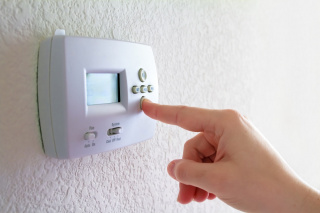When people think of humidity, they may first think about that boggy, sweaty feeling of being outdoors on a humid day. But humidity isn’t just a summer problem. It lasts all year and endangers more than your comfort. Did you know that humidity can actually have an impact on your HVAC system? Here’s how uncontrolled humidity can cost you money and affect your indoor comfort year-round.
About Humidity
Humidity is the concentration of evaporated water present in the air. Many people think of humidity as a summer problem. That’s because when a hot day is also humid, your sweat is slow to evaporate, and your body has trouble keeping itself cool. But there’s usually some amount of moisture in the air year-round.
The problem with humidity is that it can deposit as liquid moisture onto any surface that contacts the air. And here are the big problems with that, especially when it comes to HVAC systems.

Working Hard
If you’re running your air conditioner, the system will work hard to remove heat and humidity from the indoors, sensing both high temperatures and sticky water vapor. Removing both heat and humidity is essential for keeping you comfortable indoors. But this means that your air conditioner will need to work harder in order to keep you cool. In fact, during warmer seasons, people are actually more likely to set their indoor temperatures much lower on humid days. When your air conditioner works harder, you pay more for all of this energy use, and you’re more likely to need air conditioning repair. This is because the perishable parts in a harder-working appliance will break down sooner or, in the case of coolant liquids, diminish faster.
Destructive Moisture
Moisture doesn’t just make systems work harder. It can also enter the inside of appliances, and expose vulnerable metallic or even electrical components to water. Water can rust and deteriorate the inside of your air conditioner. Uncontrolled humidity during cold months can result in moisture damaging your furnace. This can damper the performance of these HVAC components. You should hire a heating and air conditioning repair team to inspect your appliances for rust.
Test for Humidity
Here’s a simple test that anyone can do to determine their indoor humidity levels, even without a humidity gauge. First, check your windows for fogginess. Because of the differing temperatures on each side of a pane of glass, humidity tends to collect there. Run your finger across the window. If the mist is indoors, then your indoor humidity levels are too high.
Also, check for damp or musty indoor odors. Humidity provides ample moisture to nourish mold, so it will grow in a humid environment. Check for signs of mold like black or green spots on walls and in grout.

How to Dehumidify
Thankfully, there’s an easy way to control humidity in your home year-round. Ask an AC and heating repair team to install a dehumidifier directly onto HVAC appliances. This will not only help you feel more comfortable but protect your heating & air conditioning units from destructive moisture.
Contact Omega Heating & Air to learn about dehumidifiers that are right for your home HVAC system. We offer heating and air conditioning repair in Stockbridge, as well as offer installation, tune-ups, and upgrades to your current system. Give us a call at 404-438-0353 today to learn more!


